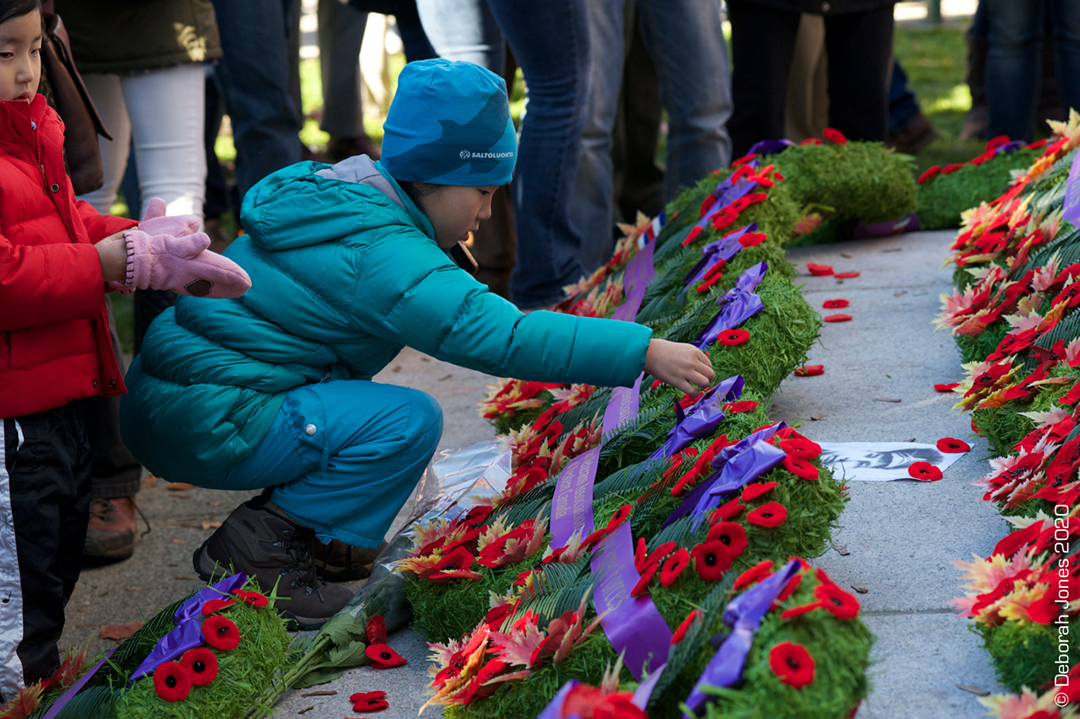
by Deborah Jones
(originally published November 11, 2020)
VANCOUVER, BC – Remembrance in COVID Time. Cenotaphs closed. Veterans cloistered. Citizens warned to stay away, safe from the pandemic. It’s a day off work in many places, but with so many now working from home, who would notice any difference?
On this day, most years, we’d stand shivering to witness sober parades and ceremonies. Today at 11 a.m., we go outside our front door. We cock our ears for the strains of a bugle or bagpipes. We scan the sky for the old war planes on their annual fly-over. We listen for the tribute of silence.
We hear traffic, watch people rush past, listen to pop music streaming from someone’s open window. Global stock markets roar at full throttle. Stores are open for consumption as usual.
“Take up our quarrel with the foe:
To you from failing hands we throw
The torch; be yours to hold it high….” – John McCrae, In Flanders Fields
Remembrance Day is a story. And, like all stories, it’s less about its creator’s intention than how the listener receives the tale.
Is it about honouring those who fought? Mourning those who died? Of course. That, and so much more.
A current frenzy on social media claims the whole thing, from red poppies to the ceremonies, is an offensive glorification of war, homage to imperialism. Oh, please. Piss off.
Piss off, because this story forces us to notice the barbarity of which humans are capable. If that offends you, good.
Barbarity is offensive. So is the fact, in our time of marvels, we still need prompts to remember it. We have a choice: avoid or dismiss this offense (the coward’s way out), or brandish it like a torch. We can choose to see it as propaganda, or know at heart it’s one of our big Stories – a story we get to interpret.
Sigh. Such serious, no-fun stuff – lighten up! demands a world weary of pandemic and politics. It’s a day off, isn’t it?
No. It’s not a day off, not a holiday.
What happens if we can’t be serious about this at least once a year, even for the short period of silence on the 11th hour? Don’t bother answering that. We all know what happens – we’ve been there before.
Remembrance is about accepting responsibility. About Adulting. (Sigh.) It’s about using the agency we have to take up and wield our political tools – because the main alternative to clumsy, challenging, exasperating, politics is to wield weapons.
Yeah yeah yeah, says the world, but all that bloodshed was back then. This is now. And we’re tired of politics, everywhere. Erm. Have you looked around, lately? Have you read our tea leaves and imagined the future we are creating? You, yes, you, and me.
Wars are not mongered by ordinary people going about ordinary lives. WWI was, it’s said, a family dispute – insider barbarianism – that sucked in and slaughtered millions of humans. WW I was, arguably, a continuation of WW II – with an additional host of horrors.
WW I was not mongered by both my grandfathers, sent by barbarians to the trenches of WWI as cannon fodder, then sent home injured. WWI was not started by my grandmother, whose electrician and welder skills helped build its war machines. WWII was not started by my late mother and father, involuntarily sucked into the war as teens and turned, still children, into soldiers. They are why I take care to remember this day; that is my own family story. But it’s a story shared by all of us, in various ways, from a myriad of places.
But. All the best stories have a twist at the end. And the twist in the story of Remembrance Day is that ordinary people, my people and yours, today have the power to change our world. We have the choice to drop John McCrae’s torch of fallen soldiers – or to take it up against warmongers, and all the conditions they create to promote war.
For me, Remembrance Day is the opposite of glorifying war – it’s about remembering how badly we fucked up, and doing everything in our power not to do it again.
And with that interpretation, Remembrance Day is really a story of hope and renewal. But only if we remember.
~30~
